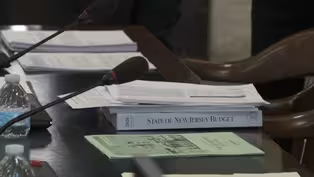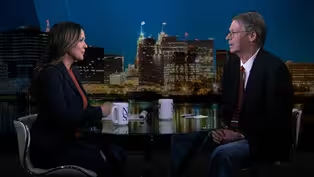NJ Spotlight News
'Liberation Day': NJ economists debate Trump trade policy
Clip: 4/1/2025 | 9m 40sVideo has Closed Captions
Interview: Michael Busler, Stockton University; Parul Jain, Rutgers University
President Donald Trump has dubbed April 2 “Liberation Day,” when he will unveil the next phase in his trade policy, focused on reciprocal tariffs. According to the White House, this will entail rolling back “unfair trade practices that have been ripping off the country for decades.”
Problems playing video? | Closed Captioning Feedback
Problems playing video? | Closed Captioning Feedback
NJ Spotlight News is a local public television program presented by THIRTEEN PBS
NJ Spotlight News
'Liberation Day': NJ economists debate Trump trade policy
Clip: 4/1/2025 | 9m 40sVideo has Closed Captions
President Donald Trump has dubbed April 2 “Liberation Day,” when he will unveil the next phase in his trade policy, focused on reciprocal tariffs. According to the White House, this will entail rolling back “unfair trade practices that have been ripping off the country for decades.”
Problems playing video? | Closed Captioning Feedback
How to Watch NJ Spotlight News
NJ Spotlight News is available to stream on pbs.org and the free PBS App, available on iPhone, Apple TV, Android TV, Android smartphones, Amazon Fire TV, Amazon Fire Tablet, Roku, Samsung Smart TV, and Vizio.
Providing Support for PBS.org
Learn Moreabout PBS online sponsorshipWell, President Trump has dubbed tomorrow April 2nd Liberation Day, when he'll unveil the next phase in his trade policy, which is focused on reciprocal tariffs that the White House says will rollback, quote, unfair trade practices that have been ripping off the country for decades.
The president says taxes on imports from other countries will free the U.S. from reliance on foreign goods, But a lot remains unknown about how much the tariffs will be and what items they'll effect.
The trade plan also comes one day before 25% tariffs on imported auto and auto parts begins.
For more on what to expect and how it'll hit you, I'm joined by Stockton University economist Michael Butler and Rutgers University economics professor Parul Jain.
Well, my thanks to you both for coming on the show.
Michael, let me start with you.
President Trump argues that tariffs will help reduce trade deficit.
Do you believe that that approach can have a significant impact over time?
And in how much time might we see that change?
So we have a very severe problem in that we have a very negative balance of trade.
This year, for instance, we'll import about $1.2 trillion worth of goods and export only about $400 billion worth.
$800 billion shortfall is money flowing out of the country.
And it's really wealth that the U.S. is losing.
So how do you fix that?
Two ways.
You either start importing less or exporting more.
Trump's first position would be to export more.
So all he's saying is whatever tariffs anybody places, they should be the same reciprocal tariffs.
Right now we charge a two and a half percent tariff on virtually everything brought into the country.
We try to import the China.
They charge a 25% tariff on Corvettes.
They charge a 50% tariff.
The European Union, we let them bring their cars in here to two and a half percent tariff.
They charge a 10% tariff and then they have this value added tax that adds more to it.
India Harley Davidson has a big market in India.
India placed a 100% tariff on Harley Davidson motorcycles.
So what did Harley do?
They went over to India to build a plant.
So by placing these tariffs, I'm not sure all of these are going to go into effect.
This is a negotiating point.
Some will, especially the ones on China, but on some of our more favorable trading partners, I have a feeling a deal will be made and you won't see all of these tariffs going into effect.
Paul, let me let me get you in on the conversation.
How do you see it?
I mean, what Michael is saying is that essentially it's, you know, driven these folks out and that these reciprocal tariffs have sort of already been there.
They've already been there.
And as a matter of fact, we've been doing pretty well with them.
So the idea of the idea is to try and improve the deficit, which is not that substantial to begin with.
I mean, take a look at the numbers which you just quoted.
It's still a, you know, less than 5% of US GDP.
And so consequently, there's a better way to go about things rather than to have tariffs imposed universally.
And influence world trade patterns.
We've been we've done that, and it has never succeeded.
You know, I have back to the Smoot-Hawley tariffs of the 1930s.
And in which case the volume of world trade just shrank.
So living on improving the world, you know, the US deficits, what we're going to be having is a much more weaker economy and a weaker global economy on account of this.
Let me stay with you on that, though.
Do tariffs, though, play a role in encouraging more domestic production and then in return, also creating more jobs in the U.S.?
Is there not a role there.
In the longer term?
That may be feasible, but in the short term, that's not going to be feasible.
And a lot of production processes, the supply chains have been put together such that you're using some of the imports, the you know, the supply chains are very complex and the product goes back and forth, back and forth, let's say, between Canada and Mexico.
And as a result of which, the improvements that we're thinking about, improvement in jobs, improvement in production activity that might not be there at all in the near-term.
This takes a very long time to play out.
And unfortunately, there's going to be a lot of distress and dislocation in the short term.
Michael, how do you then combat that argument that that rule is is stating that that other critics have have also stating that in the immediate it increases costs for consumers and and can disrupt the global supply chain.
I mean, how do you reconcile this with the claims of long term benefits?
So Trump doesn't want to convene a committee, a bipartisan committee, negotiate this, negotiate that and let years go by.
He wants to fix it.
Today, he announces a 25% tariff on this, said, you know, we were going to build a plant in Mexico.
We can't do that anymore.
We're going to build it in Indiana.
Hyundai comes over and says, we're building a steel production facility and car manufacturing here.
The 25% tariff.
The foreign companies can't afford to lose that much business.
They're going to come over here rapidly and start building plants.
I can't build them overnight, but we will build them rapidly.
In addition to that, for automobiles, the U.S. car companies today are operating about 65% of capacity.
They'll start ramping up production literally overnight, probably at a second and third shift.
And people will start to say, look, American cars are just as good as the foreign cars and they're a heck of a lot cheaper.
That will encourage more domestic production, the 25% tariff on steel.
Michael, let.
Me.
Let me ask you this.
Manufacturer, because.
We've spoken with with automakers and businesses in general who say just the unpredictable nature with which these have been rolled out on again, off again one day, you know, it's different to the next, but it's made it really difficult for them to plan for the future.
What do you say to that and the way that it's been rolled out?
So nothing is etched in stone here.
President Trump is a business person first.
He understands how to negotiate instead of waiting a long time to get these people to agree to anything.
What a business person does.
We had a reluctant trading partner is create a sense of urgency.
So he puts these tariffs on.
It creates a sense of urgency.
There's a lot of uncertainty now, and that's why the stock market's doing so poorly.
And I would agree with you.
But you'll see in the next couple of months, even starting tomorrow when he's going to announce this day of liberation, you'll start seeing negotiations take place that will end up eventually with reciprocal tariffs, more production in the U.S., especially of steel, aluminum and vital medical products and Made in America will now be prestigious in the world, will have more opportunities for people to have jobs.
Your final thoughts will attract investment.
Your final thoughts, Earl?
I think, you know, a lot of what Michael is saying is a little too far fetched for me.
The immediate impact and the numbers that I'm seeing are indicative that immediately we're going to get back to GDP growth in the United States.
We're going to see much higher rates of inflation.
And the numbers that I'm seeing from the administration, you know, we're going to get $600 billion a year amounting to over ten years.
So we're going to be $6 trillion in, you know, in the government coffers.
Where is that money coming from?
It's coming from U.S. consumers.
You know, so this is a tax.
This is protectionism.
Does the U.S. needed does are the better avenues to to negotiate fairer trading conditions?
Sure.
Much.
But this is just like a big knock on everybody.
And all of us, including Michael himself, is going to be the recipient of that additional tariff.
Mike, I'll just give you a quick, quick chance to respond and then we've got to end it there.
Which is correct.
The tariff is a tax adds to the cost of the product and we'll have some upward pressure on price.
However, President Trump is going to vastly increase the supply of energy he says will cut energy prices in half by the end of the year.
Any negative impacts on inflation from these tariffs will be more than offset by the reduction in energy prices.
Energy accounts for 7% of the CPI directly and indirectly, nearly 30% a year from now.
You'll see American factories up and running again and the inflation rate will be back down to where it was when Trump left office last time, 1.4%.
All right.
Have to leave it there.
Michael Butler Perel.
Jane, great insight.
Thank you both for the conversation.
My pleasure.
Thank you.
Lawmakers face impact on NJ of volatile market, federal cuts
Video has Closed Captions
Clip: 4/1/2025 | 4m 49s | Federal cuts ‘could be drastic’ for NJ, Treasurer Elizabeth Maher Muoio tells senators (4m 49s)
NJ Spotlight News launches 'Under the Dome' reporting series
Video has Closed Captions
Clip: 4/1/2025 | 4m 26s | Interview: John Mooney, founding editor, NJ Spotlight News (4m 26s)
Providing Support for PBS.org
Learn Moreabout PBS online sponsorship
- News and Public Affairs

Top journalists deliver compelling original analysis of the hour's headlines.

- News and Public Affairs

FRONTLINE is investigative journalism that questions, explains and changes our world.












Support for PBS provided by:
NJ Spotlight News is a local public television program presented by THIRTEEN PBS

